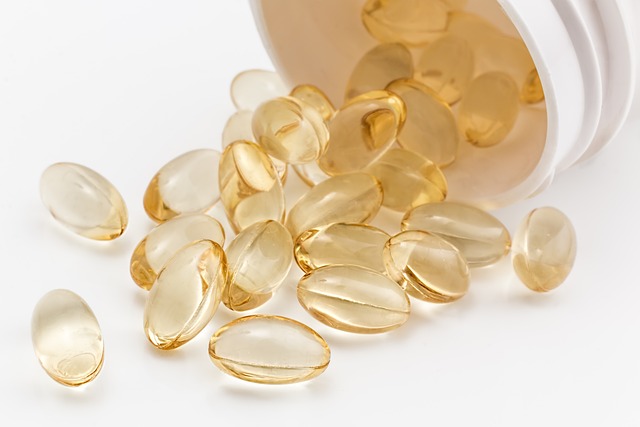Chronic inflammation, a result of prolonged inflammatory responses, leads to diverse health issues. Anti-inflammatory therapies, including stem cell, PRP (Platelet-Rich Plasma), and peptide treatments, offer innovative solutions. These holistic approaches harness the body's natural healing processes, targeting root causes for effective pain management and long-term wellness through regenerative medicine. By modulating inflammatory pathways and promoting tissue repair, these advanced techniques provide promising alternatives or complements to traditional methods in holistic inflammation management.
- Understanding Inflammatory Responses: The Body's Defense Mechanism
- Exploring Anti-Inflammatory Therapies: A Holistic Approach
- Advanced Medical Interventions: From Stem Cells to Peptide Therapy
- Integrating Regenerative Medicine for Long-Lasting Pain Relief and Inflammation Management
Understanding Inflammatory Responses: The Body's Defense Mechanism

Inflammatory responses are a natural part of the body’s defense mechanism against potential threats like injuries, infections, or irritants. When triggered, immune cells release chemicals known as cytokines, leading to typical symptoms such as redness, swelling, and pain – a process that helps protect and heal the body. However, chronic inflammation occurs when these responses become prolonged or overactive, causing damage to healthy tissues instead of repairing them. This persistent state can contribute to various health issues, including heart disease, diabetes, and even mental health disorders.
Advanced pain relief treatments and holistic inflammation management approaches, such as anti-inflammatory therapies, stem cell therapy for inflammation, PRP (Platelet-Rich Plasma) therapy for inflammation, and peptide therapy for inflammation, offer promising avenues to combat this condition. These innovative techniques aim to regulate the immune system, reduce cytokine levels, promote tissue repair, and alleviate symptoms associated with chronic inflammation, providing a more balanced and controlled inflammatory response.
Exploring Anti-Inflammatory Therapies: A Holistic Approach

Exploring Anti-Inflammatory Therapies offers a promising path to managing and minimizing chronic inflammatory responses. Beyond traditional pharmaceutical approaches, holistic practitioners have turned to innovative treatments like stem cell therapy for inflammation, PRP (Platelet-Rich Plasma) therapy for inflammation, and peptide therapy for inflammation. These advanced pain relief treatments harness the body’s natural healing mechanisms, making them powerful tools in the fight against inflammation.
Regenerative medicine for inflammation represents a significant shift towards holistic inflammation management. By promoting tissue repair and regenerating damaged cells, these therapies aim to address the root causes of inflammation rather than merely masking symptoms. This comprehensive approach not only provides effective relief but also fosters long-term wellness by restoring balance within the body’s intricate systems.
Advanced Medical Interventions: From Stem Cells to Peptide Therapy

Advanced Medical Interventions offer promising avenues for minimizing inflammatory responses and managing chronic conditions associated with elevated inflammation. Stem cell therapy for inflammation has emerged as a potent holistic inflammation management approach, harnessing the body’s natural ability to heal and regenerate tissues. These versatile cells can differentiate into various types, promoting anti-inflammatory effects and tissue repair. PRP (Platelet-Rich Plasma) therapy for inflammation is another innovative technique where a patient’s own blood is used to accelerate healing and reduce inflammation.
Additionally, peptide therapy for inflammation involves administering precise chains of amino acids that target specific inflammatory pathways. This targeted approach has shown potential in reducing chronic pain and managing conditions like arthritis. These advanced anti-inflammatory therapies, including stem cell and peptide treatments, represent a significant leap forward in regenerative medicine for inflammation, offering personalized and effective solutions for patients seeking alternative or complementary advanced pain relief treatments.
Integrating Regenerative Medicine for Long-Lasting Pain Relief and Inflammation Management

In the realm of holistic inflammation management, Regenerative Medicine emerges as a game-changer in addressing chronic pain and reducing inflammatory responses. Advanced techniques like stem cell therapy for inflammation, PRP (Platelet-Rich Plasma) therapy, and peptide therapy offer promising avenues for long-lasting relief. These anti-inflammatory therapies harness the body’s natural healing mechanisms by introducing specialized cells and bioactive factors to damaged tissues.
By integrating these advanced pain relief treatments, individuals can experience significant improvements in managing persistent inflammation. PRP therapy, for instance, utilizes a patient’s own blood to stimulate tissue repair and reduce inflammation locally. Similarly, stem cells have the remarkable ability to differentiate into various cell types, fostering regeneration and minimizing chronic inflammatory states. Peptide therapies further enhance these effects by signaling cellular processes related to pain perception and inflammation, providing a more comprehensive approach to holistic inflammation management.
In conclusion, managing stress and inflammatory responses is a multifaceted approach that leverages both traditional and innovative techniques. From understanding the body’s defense mechanisms to exploring anti-inflammatory therapies, holistically addressing inflammation offers significant benefits. Advanced medical interventions like stem cell therapy, PRP therapy, and peptide therapy represent promising avenues for long-lasting pain relief and effective inflammation management. Integrating regenerative medicine into these strategies further enhances their potential, paving the way for a more vibrant and balanced life in today’s world.
